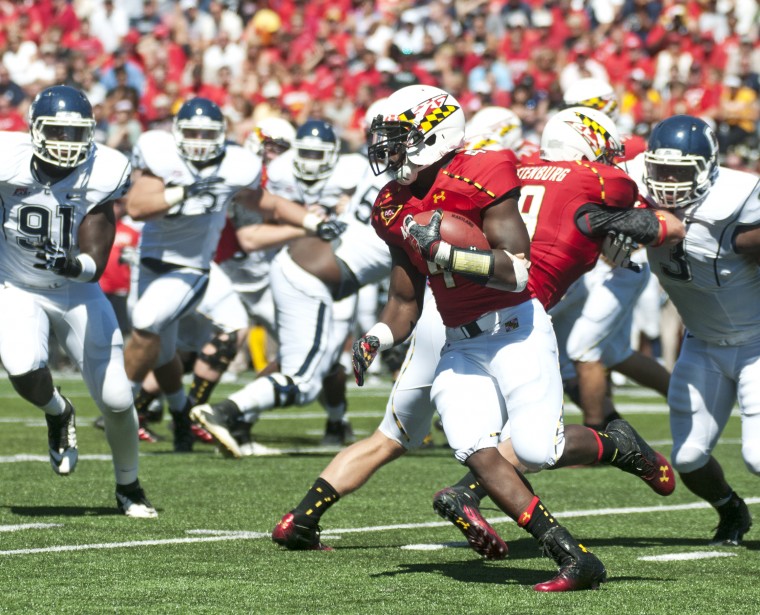
Wes Brown
UPDATE 5:20 p.m. Aug. 2
The university has reached an agreement with Wes Brown for a one-year suspension with a possibility of shortening to one semester if certain benchmarks are hit, Brown’s attorney said Friday afternoon.
“Wes has indicated to me that he plans to absolutely hit each and every one of those benchmarks,” said Jason Shapiro, a 22-year criminal defense attorney with Columbia-based Shapiro & Mack P.A. “The benchmarks that the university has set are very reasonable.”
In a news release Friday night, the university’s athletic department wrote Brown will not play for the Terps in the upcoming season.
“We support the University of Maryland’s decision,” says coach Randy Edsall in the release. “I have spoken with Wes. He accepts the sanctions and understands what is expected of him moving forward.”
Brown will spend the coming months taking community college courses and training physically, Shapiro said.
“When classes start in January, he plans to not miss a beat academically,” Shapiro said. “When the football team gets back together for their spring practice, he plans to be in outrageously good shape.”
Though Shapiro would have preferred to see Brown back at school for the fall semester, he said both he and Brown are “hopeful” the suspension will be shortened to one semester.
Brown can use the upcoming season as a redshirt year, meaning he would still have three years of eligibility remaining with the Terps. Brown entered the summer listed as a co-starter with Brandon Ross and Albert Reid.
Check back for updates on this developing story.
Original story below:
Although prosecutors opted to drop all charges against Terrapins running back Wes Brown on Tuesday, he may still face university sanctions, school officials said.
Brown was suspended from the university after his arrest and university officials still plan to pursue disciplinary action. Brown must now choose from three disciplinary processes as the next step in addressing those charges.
On July 3, Brown was arrested and charged with second-degree assault, theft and unlawful interception of oral communications, according to University Police spokesman Sgt. Aaron Davis.
When students face university charges, according to Office of Student Conduct Director Andrea Goodwin, they are allowed to resolve their case either through a disciplinary conference — a meeting with an administrator — or a disciplinary hearing, where a panel of students makes a decision based on the evidence provided. As a third option, Brown may also choose to accept the sanctions his disciplinary charges carry without contest, said an athletic department spokesman.
“Any student who is referred to our office gets those options for resolutions,” said Goodwin, adding that since Brown’s case is a part of his educational record, the specific disciplinary charges are confidential.
According to Goodwin, a student can be charged by the university but not found responsible by either the disciplinary conference or hearing panel. If Brown chooses a conference, the decision made will be final, while for disciplinary hearings Brown would have the option to appeal a decision. Any decision on the charges will not be made public by the university, Goodwin added.
Before his arrest, Brown was stopped by Baltimore police officers, who were working in conjunction with University Police, to discuss a nonfatal Baltimore shooting, according to Davis. In a statement filed through the Prince George’s County District Court, police said Brown’s vehicle was seen at the shooting scene.
Brown’s lawyer, Jason Shapiro, a 22-year criminal defense attorney with Columbia-based Shapiro & Mack P.A., said by phone that his client was wanted as a witness to the shooting but had no obligation to talk to police.
“My client is not a suspect in Baltimore,” Shapiro said. “There is no evidence against him that he shot anyone, that he was involved in a shooting — anything of that sort.”
Brown wanted to either answer questions in public or have his parents with him for questioning at the station Shapiro said, adding that the police then grabbed his client and an altercation ensued.
“I guess they forgot that they were trying to grab one of the most elusive running backs in the ACC because he put a move on them,” Shapiro added. “Didn’t punch anyone. Didn’t push anyone.”
All charges against Brown were dropped on Monday and the preliminary hearing scheduled for Wednesday was canceled because of a lack of evidence, said Leslie W. Graves, a Prince George’s County state’s attorney’s office spokeswoman.
The news initially broke in a Twitter post from @PGStAtty on Monday afternoon and was confirmed the next day.
“The sense from our side is that Brown was resisting an unlawful arrest and not assaulting a police officer,” Graves said.
The university process, however, is separate from any criminal process, Goodwin said.
University officials plan for cases to take 45 days, Goodwin said, although it may take longer to get a full panel of students together if Brown chooses a disciplinary hearing because of the time of year.
In an interview on ESPN Radio Wednesday, coach Randy Edsall said he didn’t have details on Brown’s hearing, though he thought it would be in the near future.



